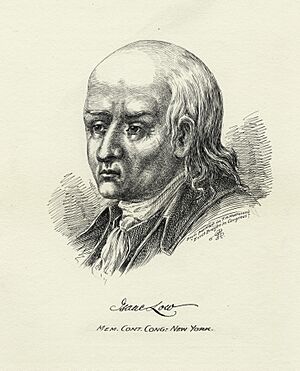Isaac Low facts for kids
Quick facts for kids
Isaac Low
|
|
|---|---|
 |
|
| Member of the Continental Congress | |
| In office September 5, 1774 – October 26, 1774 |
|
| Personal details | |
| Born | 13 March 1735 Piscataway, Province of New Jersey, British America |
| Died | 25 July 1791 (aged 56) Cowes, Isle of Wight, Great Britain |
| Spouses |
Margarita Cuyler
(m. 1760) |
| Children | Isaac Low Jr. |
| Parents | Cornelius Low Jr. Johanna Gouverneur |
| Relatives | Nicholas Low (brother) Abraham Cuyler (brother-in-law) Cornelius Cuyler (brother-in-law) Cornelis Cuyler (father-in-law) |
| Occupation | Merchant |
Isaac Low (April 13, 1735 – July 25, 1791) was an American merchant from New York City. He was a member of the Continental Congress, where he signed an important agreement called the Continental Association. Later, he also served as a delegate to the New York Provincial Congress. Isaac Low first supported the American cause for independence, known as the Patriots. However, he later changed his mind and joined the Loyalists, who wanted to stay loyal to the British King during the American Revolution.
Contents
Isaac Low's Early Life
Isaac Low was born on April 13, 1735. His birthplace was Raritan Landing in Piscataway, which was then part of British New Jersey. His parents were Cornelius Low Jr. and Johanna Low. Isaac also had a brother named Nicholas Low.
His father, Cornelius Low Jr., was a successful merchant and shipper. He built a large house called the Cornelius Low House, which still stands today. This helped make their community, Raritan Landing, well-known. Isaac Low's family had roots from German, Dutch, and French Huguenot settlers.
Isaac Low's Career and Public Service
During the French and Indian War, Isaac Low worked as a tax commissioner for the New York government. He became a very important merchant in New York City. He owned a lot of land and had a large trading business.
In 1763, Low was chosen as a delegate to the Stamp Act Congress. This was a meeting where colonists protested against new taxes from Britain. He spoke out strongly against "taxation without representation." This meant people shouldn't be taxed if they didn't have a say in the government.
In 1765, he became the chairman of New York City's Committee of Correspondence. These committees helped different colonies communicate and organize their protests. By 1774, he was chairman of New York City's Committee of Sixty. This group helped enforce boycotts against British goods.
In 1774, Isaac Low was one of nine delegates from New York chosen for the First Continental Congress. The next year, he also joined the New York Provincial Congress. In these roles, he tried to find a peaceful solution with the British. In 1775, he helped start the New York Chamber of Commerce and became its first president.
Isaac Low and the American Revolution
Isaac Low did not want a war with Britain. After the Declaration of Independence was announced in 1776, he stopped supporting the Patriots. He moved to New Jersey, where he was arrested because people thought he was disloyal.
He was eventually released after George Washington helped him. However, Low then worked with the British forces who occupied New York. Because of this, the New York assembly took away his property in 1779. Four years later, Isaac Low moved to England. He lived there until his death in 1791.
Isaac Low's Family Life
In 1760, Isaac Low married Margarita Cuyler (1738–1802). She came from important families, the Schuylers and the Van Cortlandts. Her father, Cornelis Cuyler, and her brother, Abraham Cuyler, both served as mayors of Albany. Another brother, General Cornelius Cuyler, was a British Army officer.
Isaac and Margarita had one child, a son named Isaac Low Jr. He studied French and later became a commissary-general in the British army.
Isaac Low passed away in Cowes, on the Isle of Wight in Great Britain, on July 25, 1791. While some family stories say his wife joined him in England, records show she died in Albany in 1802.
 | Aurelia Browder |
 | Nannie Helen Burroughs |
 | Michelle Alexander |

